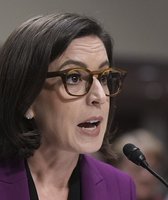Stand up for the facts!
Our only agenda is to publish the truth so you can be an informed participant in democracy.
We need your help.
I would like to contribute

A farmer in central Illinois unloads a truck full of harvested corn, which can then be turned into a gasoline additive known as ethanol.
With gasoline prices as high as $4 a gallon recently, the ethanol industry is boasting that its corn-based additive is saving you money at the pump.
On its website and in a series of bus and subway ads in Washington, D.C., the Renewable Fuels Association, a trade group representing the ethanol industry, claims its product cuts the price dramatically.
"Ethanol reduced gas prices by 89 cents per gallon in 2010," says one ad. "Ethanol reduced the average American’s household gasoline bill by more than $800. If ethanol disappeared, gas prices could rise by as much as 92 percent."
The ad blitz is timed to the latest round in the debate about federal subsidies for ethanol.
One hotly contested federal subsidy offers producers a credit of 45 cents for every gallon of ethanol blended with gasoline. The credit – which is worth an estimated $6 billion a year -- had been scheduled to expire at the end of 2010, but Congress extended it for another year.
Last month, the U.S. Senate approved legislation to end the subsidy, as well as a separate, 54-cent-per-gallon tariff on imported ethanol. While the Senate measure is not expected to become law, it re-energized the long-simmering debate.
With the ethanol industry cranking up its advertising and public relations campaign, PolitiFact decided to puts its biggest claim to the Truth-O-Meter. Does ethanol really save 89 cents per gallon?
A study of disputed value
The Renewable Fuels Association cited a study by two economists -- Xiaodong Du from the University of Wisconsin and Dermot J. Hayes of Iowa State University -- published in April. The study has numbers that back up the 89-cent claim, but outside experts we consulted said the ad left out important context. Here are some of their criticisms:
- The study’s funding. The authors thanked the Renewable Fuel Association "for their financial support." This doesn’t mean the study is right or wrong, but it does mean that the RFA is quoting research it helped pay for.
- Choice of time period. The paper cited the 89-cent figure for 2010, but it also noted that the price difference would have been just 25 cents per gallon over a longer period of time -- January 2000 to December 2010. It's reasonable for the association to choose the most recent year, but that was also a year of especially high gasoline prices. The longer-term impact would have been less eye-popping.
- The paper poses an unrealistic scenario. Experts told us that the study's underlying assumptions – comparing what would happen if "ethanol production came to an immediate halt" -- is not plausible in the real world.
"This is a fantasy study dreamed up to answer a question that no one has asked: What would happen if ethanol disappeared?" said Steve Ellis, vice president of Taxpayers for Common Sense, a group that has been critical of ethanol subsidies. "We are not arguing that ethanol should cease to exist, just that it make its way in the marketplace."
The study focuses on short-term impacts and ignores the long-term. A big reason why ethanol production has reduced gasoline prices is that it has kept oil refineries from having to operate at full capacity. When refineries operate at full capacity, they are able to charge higher prices. But while this is a credible short-term and medium-term argument, over the longer term, oil companies will adjust their capacity and the ethanol impact on gas prices should shrink.
Another limitation of the study: It ignores other negative economic impacts from ethanol subsidies, such as higher food prices. There is evidence the subsidies have raised corn prices and, in turn, hiked prices in industries that rely on corn for feed, such as beef production.
In addition, the ad doesn’t account for "all the coal, natural gas, diesel fuel, soil, ground water, etc., that were used up to produce ethanol," said Tad Patzek, an engineering professor at the University of Texas. Finally, the ad doesn’t factor in roughly $6 billion direct hit to the Treasury (and, indirectly, to American taxpayers) from the subsidies.
When we presented our analysis to the Renewable Fuels Association, an official noted that even a 25-cent increase in gasoline prices would amount to $34.5 billion per year in added costs for gasoline -- "far outweighing" the annual cost of the ethanol blending subsidy.
The group also argued that it’s unfair to include factors outside of the scope of a brief advertisement that focuses squarely on gasoline prices.
"The ad focuses on gas prices," said Geoff Cooper, vice president of research and analysis with the Renewable Fuels Association. "Not food prices. Not corn prices. Not the cost of (the subsidy). Not lifecycle greenhouse gas emissions and energy use. We are more than willing to engage in a thoughtful discussion on those issues, but they are outside the scope of the paper on which the ad is based."
On the issue of whether the immediate end to ethanol is realistic, Cooper said that "there have been recent calls to repeal the renewable fuel standard, kill the tax credit, and essentially undo all of the entire industry’s policy foundation. So, it is not entirely ‘unrealistic’ to envision a scenario in which ethanol production is significantly curtailed."
Still, we are not persuaded. While the Senate bill would have ended certain subsidies, it would not have banned production outright, and even the changes proposed in the Senate bill would not have touched the renewable fuel standard, which aids the ethanol industry and ensures its partial or even complete survival.
So while changing or eliminating the law on ethanol subsidies might have an impact on prices at the pump, it’s highly unlikely that the industry would cease to exist -- so the immediate impact on gasoline prices would be less than 89 cents, and even lower as markets adjust in the longer term. We rated the Renewable Fuels Association claim Barely True.
Our Sources
See Truth-O-Meter item.






































